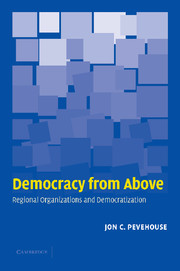Book contents
- Frontmatter
- Contents
- List of figures and tables
- Acknowledgments
- Abbreviations
- 1 Democratization and international relations
- 2 Regional organizations, the transition to and the consolidation of democracy
- 3 The supply-side of democratization and initial tests
- 4 Regional organizations and the transition to democracy
- 5 Regional organizations and the transition to democracy: evidence from cases
- 6 Regional organizations and democratic consolidation
- 7 Regional organizations and the consolidation of democracy: evidence from cases
- 8 Conclusion
- References
- Index
7 - Regional organizations and the consolidation of democracy: evidence from cases
Published online by Cambridge University Press: 22 September 2009
- Frontmatter
- Contents
- List of figures and tables
- Acknowledgments
- Abbreviations
- 1 Democratization and international relations
- 2 Regional organizations, the transition to and the consolidation of democracy
- 3 The supply-side of democratization and initial tests
- 4 Regional organizations and the transition to democracy
- 5 Regional organizations and the transition to democracy: evidence from cases
- 6 Regional organizations and democratic consolidation
- 7 Regional organizations and the consolidation of democracy: evidence from cases
- 8 Conclusion
- References
- Index
Summary
IOs and consolidation: causal mechanisms
The purpose of this chapter is to evaluate three case studies to determine whether the causal mechanisms outlined in Chapter 2 are behind the statistical associations between regional organizations and democratic consolidation found in Chapter 6. The countries examined include Greece, Paraguay, and Guatemala. Table 7.1 presents a list of the causal mechanisms to be examined in each case study. In addition, the case of Turkey in Chapter 6 included a test for the mechanisms associated with consolidation since that case contains dynamics of both democratic breakdown and redemocratization within a relatively short time frame.
As in Chapter 5, each case begins with a brief historical introduction of the country. I then review the causal mechanisms, discussing whether there is evidence of IO influence via these processes. Finally, for each study I discuss any countervailing evidence mitigating the impact of IOs on the consolidation process.
Greece: European institutions and consolidation
Perhaps more than any other group in history, the Greek people have experienced an ebb and flow of democracy. From the origins of the concept of democracy in ancient Athens to the movement for independence in the early nineteenth century to the Greek civil war, the Greek populace has experienced monarchy, autocracy, democracy, and most systems in-between.
The twentieth century was no better for the Greek populace in terms of this vacillating experience with democracy.
- Type
- Chapter
- Information
- Democracy from AboveRegional Organizations and Democratization, pp. 169 - 198Publisher: Cambridge University PressPrint publication year: 2005

